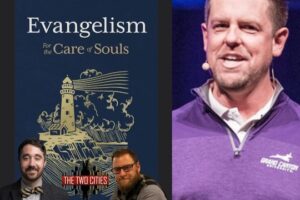“Therefore go and make disciples of all the nations.” I think anyone who has spent time in the church has had a life filled with experiences where the execution of both new disciple making and disciple deepening have been found dreadfully wanting. So, how do we move forward from here?
In the last few decades, many oft-labeled “emerging” church leaders have sought to champion new approaches to engaging a post-modern generation with the Gospel. One pastor with such an obvious heart for the lost of the 21st century is the well known and controversial Erwin McManus. Recently, I was asked by a friend to the first in a new video series he has created called “Crave: the Documentary,” part of his Power to Change ministry based in Canada Next, I was encouraged to give careful thought about the methods and approaches to evangelism that McManus advocates. As one who is currently engaged in Outreach Activities in my local church family, I find this to be a very important, and relevant, topic for analysis.
First, by way of summary, “Crave” is a documentary compiled of montage of “heart-to-heart” interviews with non-Christian people of different status levels and backgrounds, and McManus rhetorical and though inducing questions, specifically the question “have we gone about evangelism all wrong? What if… there is a better way.”
Below, I list some of my thoughts and responses to the assumptions underlying McManus’ approach:
1) Assumption: Every human being is craving for meaning, and is yearning for destiny.
Aka, Pascal’s “God-shaped whole” argument. Although I can certainly identify with this, I know of countless people with no connection to Christianity who say that they are has happy as can be, and have no sense of inner emptiness or craving for identity. In fact, simply google searching, you can find hundreds of feedback blogs and comments from those who do not profess to be Christians that they see this is silly, and absolutely love living their life for themselves (or whatever they claim to be living their lives for), and who feel like they are missing nothing. If McManus assumption is correct, do we simply tell ourselves that these people are being dishonest with themselves? Some might be. But, can we say that biblical anthropology affirms that God shaped hole/ longing for meaning” is the heart of every person, and thus, should be the cornerstone assumption of a church’s evangelism ministry? I don’t believe so. This seems to be an oversimplification of all the complexities and problems that shape the heart of unredeemed man.
Furthermore, what if we do our best to put ourselves in the shoes of a 7th century Israelite, or a 1st century Corinthian God-fearer- to what extent does “the appetite for intimacy and belonging” typify the semitic mindset? I’m not suggesting that relationships and intimacy were not existent at those times of history, and the people were tantamount to robots. However, I wonder how much this assumption about the core craving of the human soul is really shared by the indentured child laborer in Cambodia, the child solider in Uganda, or working farmer in Argentina. It could be that this simplification of the human soul to a craving for significance is really the reflection of an existentialist and western worldview projected upon the soul of mankind everywhere.
My thoughts also then steer me towards thinking “what were the pivotal worldview components of a first century, agrarian family in Palestine, to which the NT might have been written?” Perhaps at the top of the list would be the centrality of clan and family, of national/ethnic identity. This determines who you belong to, who you are to love, and who you trust to love you. Perhaps because these ties were more strictly enforced and conveniently provided for you, that people didn’t need to wander around asking “what’s my purpose and where to I belong?” because they were told this from square one of life. This being noted, the NT is full of language that richly describes the beauty, as well as the application and implications of, being adopted and identifying with the true family of Jesus. Yet, perhaps this teaching is written to redefine family in the context of the social climate of Jesus’ day, versus being written to guide and to enlighten the nomadic soul’s quest for destiny and self-realized fulfillment. Thus, this assumption may be “directionally correct,” but it’s articulation in “Crave” might represent this truth garbed in existential clothing.
2) Assumption: Everyone wants to play a “world changing role” in “making the world a better place.”
Well, that’s what most who are reading this blog were raised hearing in school and likely in our homes. However, although I don’t rule it out, I think we can all share in wondering if this really is the inner heartbeat of the average person. Certainly, God’s historical-redemptive plan not just for man but also for His creation will accomplish this. In fact, make it a glorious place, a place where this world and God’ people both become “new creations” as the incarnation becomes consummate with Jesus coming down to actualize his reign on the New Earth (Rev 21). And certainly, with man being created to be God’s viceroys and caretakers of the earth (Gen 2:15), even though this design has been tainted by sin. For this reason, I think that this assumption is also directionally correct. However, I don’t know that targeting and nurturing this desire should be a primary strategic focus in the Church’s evangelism focus.
3) Assumption: People can tell that something is different about Christians
I think we can all identify with the anxiety expressed in DC Talk’s song “What if I Stumble” (sorry, I date myself). No believer is perfect, and we all have our regrets. However, for someone who truly has known God, who has tasted the honey-sweet richness of God’s word as the nourishment to a soul made alive though the power of the cross- if you let this light shine… people will notice. There is one scene in the film where McManus is talking with a hip-older man, and he says “I can see that you know God. I can see it in your eyes. If more people had what you have…” he said he would give this Jesus-thing a try. Perhaps sometimes we forget that our lives, even the quality of our lives as it reflects the joy and the courage of knowing God, is one of the best doors openers to conversations about Jesus.
I appreciate Erwin McManus, both for the ingenuity around his outreach ministries, and above all for his pastoral heart for seeing more join the fold of God’s family. He has absolutely been used by God to bring many to the Lord, and thus, is statistically and spiritually a far more “successful” instrument God has wielded for the purpose of growing his church than I. I offer these thoughts as part of a discussion that pastors everywhere are always having “how do we reach the lost?” By the Gospel, we all agree. But who the audience is, and how do we understand and connect to them, this will be a conversation with opinions until the day our Lord returns. I hope these thoughts fuel some contemplative ones of your own.





Leave a Reply
Your email is safe with us.